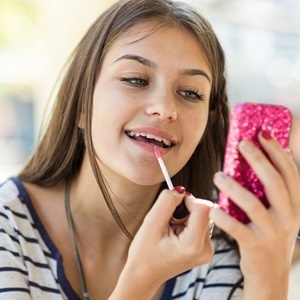
Stocking up on the latest beauty products can be costly. Is it possible to save money and still put your best face forward?
You may luck out and find things on sale at reputable retailers. But beware of prices that seem too good to be true on the internet or from sellers that may not be around tomorrow, like a flea market vendor.
Buy these products and you may end up with more trouble than you bargained for.
That's what happened earlier this year to a 47-year-old California woman. She was semi-comatose for weeks after using a Pond's-labelled skin cream purchased in Mexico. Turns out the product had been adulterated with mercury. The levels of mercury in her blood were 500 times the normal amount, according to published reports.
Buy from reputable dealers
Pond's noted in a statement that it does not use mercury in its products. The company is working with authorities investigating this product-tampering.
"Illegitimate sales, product tampering and reselling are beauty industry issues that deserve close attention and consumer awareness," the statement said.
Fortunately, most incidents of cosmetic counterfeiting or product tampering aren't as serious. But if you don't buy from reputable retailers, it's hard to know exactly what's in the products you're putting on your face.
Last year, officials in Los Angeles seized $700 000 (±R10 345 000) worth of counterfeit cosmetics from a well-known outdoor shopping area. The knock-off products included high-end brand names, including Urban Decay, NARS, MAC and Kylie Cosmetics.
Faeces in makeup
Customers definitely didn't get the luxury products they were hoping for. In fact, lab tests of the products had some surprising results. The makeup was contaminated with high levels of bacteria and faeces, according to ABC News in Los Angeles.
Asked how faeces got into the makeup, Detective Rick Ishitani of the L.A. Police Department explained that counterfeit products aren't made under the same safe and hygienic conditions that real products are.
"Those feces will just basically somehow get mixed into the product they're manufacturing in their garage or in their bathroom – wherever they're manufacturing this stuff," he told ABC News.
The US Food and Drug Administration urged consumers to be cautious.
"Counterfeit products, including cosmetics, are illegal and may be harmful to a consumer's health," an FDA spokesperson said.
The danger, according to the FDA, is that counterfeits may contain harmful or banned ingredients, unacceptable by-products of manufacturing or unapproved colour additives.
Internet another source
Companies that make cosmetics and skin care products are actively fighting counterfeiting.
"Cosmetic counterfeiting has been the scourge of the industry and it's only getting worse," said Dr Scott Wasserman, founder and CEO of Cosmetic Alchemy, maker of LiLash and LiBrow, products used on eyelashes and eyebrows.
Wasserman said Homeland Security contacted his Scottsdale, Arizona-based company three times in one month to identify suspected counterfeit products found in shipping containers. And, it's not just bulk products coming into the country that are a problem. The internet is another source of counterfeits. When Cosmetic Alchemy submitted a product trademark to the website Alibaba, the site had to remove 465 listings that were offering fake products.
How can consumers protect themselves?
Dr Shari Lipner, a dermatologist with NewYork-Presbyterian and Weill Cornell Medicine in New York City, said it's almost impossible for the average consumer to tell the difference between a branded product and a well-done counterfeit.
See a dermatologist
Lipner said you don't have to spend a fortune to maintain healthy skin, but added, "My best advice is to buy cosmetics and skin care products from reputable sources."
The FDA cautioned consumers to be wary of products on sale at flea markets or re-sold online in channels such as auctions. It recommended checking packaging carefully for any evidence that the product might have been repackaged or relabelled. Also, make sure the product looks and smells like it should.
But what if you just couldn't pass up that $10 (±R140) lipstick at the flea market that normally sells for $50 (±R730), and now it's making your lips itch? Lipner said the first step is to stop using any product that irritates your skin.
"Most skin rashes are short-lived and will improve as long as you do not expose your skin to the offending product," she said.
If the rash continues to worsen, becomes painful or blisters, see a doctor, preferably a dermatologist, Lipner said.
Image credit: iStock




 Publications
Publications
 Partners
Partners











